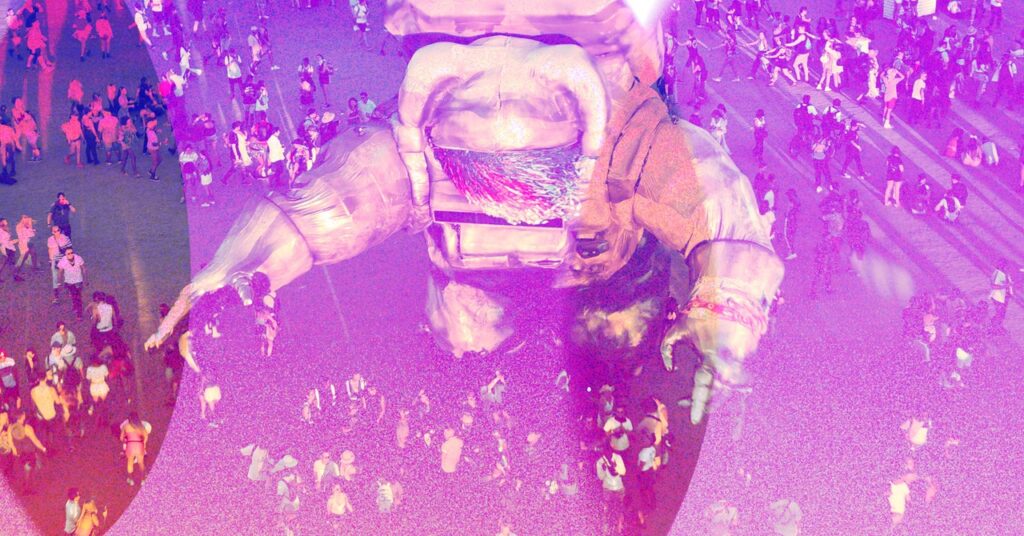Another thing that’s proven wildly popular at virtual events? Online gaming. ReedPop, the company that puts on NYCC, also produces the PAX video game conventions. This year, those conventions morphed into PAX Online, which streamed on Twitch, YouTube, Facebook Live, and other platforms. The event also had a very active Discord server, something that could easily be set up for future nongaming events, allowing “attendees” to break off to play Among Us or other games between sessions.
Bringing big Twitch energy has been a goal for event organizers of all kinds this year—including even political ones. While the Trump campaign continued to hold large in-person rallies and other events—with predictable public health results—Democratic candidates up and down the ballot shifted their campaign operations online. The party’s national convention this summer felt like a Zoom call. Fundraisers, meanwhile, happened on all sorts of digital platforms.
Much like watching a Verzuz battle on Instagram Live, people who engage with political theater—or any kind of theater—online want to be able to interact, says Eli Stonberg, CEO of Hovercast, which helped organize livestreams for Bernie Sanders and the Democratic Party in Wisconsin. Unlike many one-way streams, Hovercast’s tools made the events interactive—sharing comments and questions from people in the audience within the broadcast. “Zoom was OK right when the pandemic hit, but pretty soon after folks wanted something that was more interactive and engaging,” Stonberg says. Ultimately, Hovercast wants to offer its platform for all kinds of live events, like concerts and panels, allowing viewers to comment on them as they’re happening and even project those chats onstage with the show.
Even with all the successes of virtual events this year, organizers are eager to be able to host more traditional in-person gatherings again. “We’ve now done a bunch of online conventions across our video game shows, some esports stuff, and NYCC, and what we’ve found is that pretty consistently the fans really like it,” says ReedPop president Lance Fensterman. “But they’re not in love with it. The missing element is not surprising: It’s that shared emotional experience.” It’s the physical, tangible benefits of conventions, like conversations with strangers or sharing cosplay, that are still difficult to replicate when everyone is remote.
Concerts, conventions, festivals, and other events are also big business, bringing millions of dollars not just to the companies that put them on but to local economies. In 2020, Sundance brought some $150 million to Park City. Music festivals Coachella and Stagecoach generated more than $700 million just a few years ago. That money doesn’t get spent if people physically can’t show up. Canceling SXSW, for example, led to an estimated $350 million hit to tourism income for the city of Austin. Lots of people will want to see these events come back in person as soon as it’s safe.
That’s not to say everything will look exactly the same. Some events won’t be coming back at all. Earlier this month, for example, ReedPop announced that it “retired” BookExpo and BookCon. And even the events that do return to business as usual could still see some changes, thanks to the lessons, and opportunities, of 2020.
Shari Frilot, who runs the forward-looking New Frontiers segment of Sundance, admits that while planning a film festival in a pandemic proved challenging, it also “felt like an opportunity to do something brand-new.” She was able to move a lot of her programming online and, thanks to a partnership with Oculus, get all of the filmmakers VR headsets. Typically, directors only got to experience New Frontier’s XR offerings if they went to a dedicated space at the festival; now all of them can join. Perhaps that’s a cold comfort, but it connects creatives in a way they maybe wouldn’t have otherwise.
For both Frilot and her compatriot Jackson, Sundance’s mission of highlighting filmmakers’ work has taken on new meaning in the midst of the pandemic. “At a time like this, things don’t make sense. How do we make meaning from it?” Jackson says. “So in that sense, even during the most fleeting moment of thinking, ‘Should we even be putting on a film festival in times such as these?’ the answer came back a resounding, ‘Yes.’ That’s what we’re here for.’”
More From WIRED’s Year in Review
